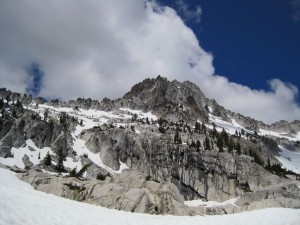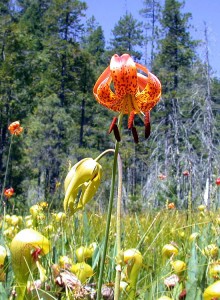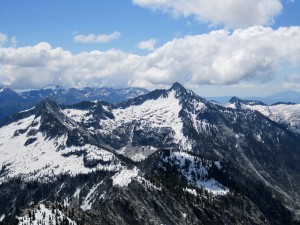I just returned from a 5 day backpack to Grizzly Lake in the Trinity Alps. Friends Andrew and Melissa and I also climbed the tallest peak in the Alps, Thompson Peak.
Grizzly Lake is a 200ft deep lake that was carved out by a glacier. The Forest Service stopped stocking around 20 years ago, but there remains a population of brook trout. I was able to catch and release 7 of these trout on dry flies with the help of a Shasta native I met there, who showed me a few tricks.
After reaching Grizzly lake via a treacherous 500ft scramble up a granite face beside a 300ft waterfall, we embarked on our climb of Thompson Peak (9000ft). This 5 mile journey shoots up a steep rocky creek to a ridge, which we followed to the summit block. After
about 100ft of sketchy climbing moves up loose granite, we reached the peak. Atop Thompson we were astonished to find clouds of butterflies floating around us. This spot, away from predators, served as the perfect mating ground.
The best part of our hike was the phenomenal wildflower show. The lush ravines and meadows were blanketed with leopard lilies, penstemon, shooting stars, indian paint brush, mock orange, and many others. The vibrant contrasts and the diversity of flora inspired me as a gardener. As humans, we can only emulate the majesty of nature. 
On the last night I camped next to the cabin of an early settler named
Jorstad. Throughout that night, sleeping out on my tarp, I was haunted by numerous animals hovering around my bedroll. One of which was a black bear, with its heavy breathing and crashing gait. My companions and I continue to wonder if Jorstad’s ghost might have played a role in this night of torment. While I’m not superstitious, I don’t think I’ll be camping next to any old abandoned cabins anytime soon.
Side Note on Facebook:
I’ve just joined Facebook with trepidation. I am very happy to connect with old friends, but I’m ambivalent about the social effects these sorts of institutions have on our culture.
What’s interesting about Facebook is that it can give you the feeling of having friends without having to exert the effort that such a social network would require in the real world. I wonder how much of people’s motivations to use Facebook are about feeling liked, and feeling like they have an audience, both of which are much easier to obtain virtually then in real life. I’m sure there have been studies devoted to this. I think that Facebook is sort of like the internal combustion engine, it has the potential to be both extremely useful, and extremely harmful. It is easy to be cynical about it, as a friend put it “this pathetic community of online social climbers”, but I feel that the topic warrants further debate. Check out this link for the con side of the argument:
http://fliptomato.wordpress.com/2006/11/18/facebook-destroys-culture/

Leave a Reply
You must be logged in to post a comment.